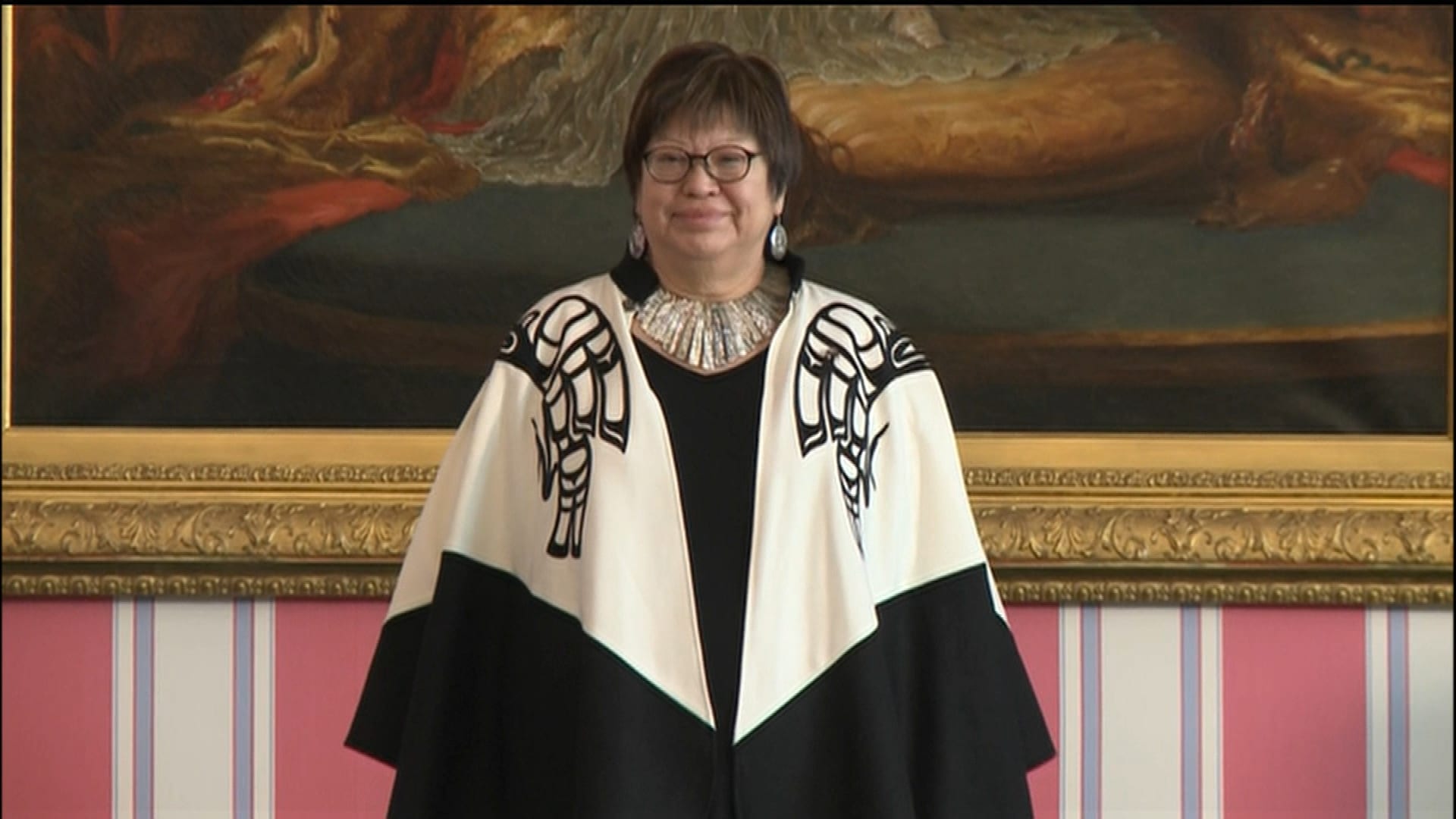
Judith Sayers is a lawyer, director of the BC First Nations Justice Council, president of the Nuu-chah-nulth Tribal Council, chancellor of Vancouver Island University and an adjunct professor with both the School of Business and Environmental Studies at the University of Victoria. Photo: APTN file
The director of the BC First Nations Justice Council is “horrified” by what a report from the RCMP’s complaint commission has revealed.
Chief Judith Sayers, a lawyer and president of the Nuu-Chah-Nulth Tribal Council on Vancouver Island, says it appears historical allegations that some RCMP officers in Prince George sexually assaulted Indigenous girls on the street were not meant to be public.
“I was horrified that things like this continue to be covered up,” Sayers said in a telephone interview Tuesday.
“This aggravates the whole situation involving Indigenous women and justice for First Nations people.”
Sayers was reacting to the damning findings of an RCMP Civilian Review and Complaints Commission (CRCC) investigation report made public by the Vancouver Sun last week.
READ THE BC FIRST NATIONS JUSTICE COUNCIL RESPONSE HERE
The commission said the RCMP failed in its duty to properly investigate its own officers, failed to open an official file, and failed to follow appropriate sexual assault investigation procedure.
It is the first time allegations from vulnerable girls on the streets in Prince George between 2000 and 2004 are recorded in a public document.
“There have been many Indigenous women and girls who have come forward about RCMP over the years,” said Terry Teegee, B.C. regional chief for the Assembly of First Nations.
“The narrative was that they were lying.”
The commission investigates complaints about the RCMP it deems “in the public interest.” This investigation report was prompted by Garry Kerr, a retired RCMP officer, who filed a complaint with the commission in 2016.
Waiting years
Kerr was a senior officer in Kamloops when he said he went to the commission after getting tired of waiting for the RCMP to investigate information he relayed on behalf of a junior officer in 2011.
He alleged via the junior officer that some officers in Prince George were sexually interfering with girls on the street during the late 1990s to the early 2000s, there was possible evidence on some videotapes, and the videotapes were stolen by an officer who may or may not have been involved.
Kerr said he first reported the information in 2011 to senior RCMP officers in B.C. and waited years for an outcome.
“It’s been a long haul,” he told APTN News. “They did absolutely everything to suppress me.”
The newly revealed report, which Kerr received in March 2021, said the RCMP told the CRCC it did investigate the allegations against its officers in Prince George in 2005 and found no evidence of criminal behaviour.
The report said the break-in that led to the loss of the tapes was a “civil” matter between once-married RCMP officers. And the missing videotapes – that allegedly showed officers sexually harassing 13- and 14-year-old girls to, among other things, show their breasts on camera – were not recovered.
“The issue here is systemic racism,” said Stewart Phillip, president of the Union of BC Indian Chiefs.
“The issue is the neo-colonial culture inherent within the RCMP.”
Phillip said he was disgusted by what the commission found internally. He said there should be a purge of leadership within the force beginning with RCMP Commissioner Brenda Lucki, who approved the report before it went to Kerr.
“She should resign,” Phillip said in a telephone interview. “It’s absolutely astonishing that that characterizes policing in Canada.
“It’s a national disgrace.”
National Inquiry
Marion Buller, a former commissioner with the National Inquiry into Missing and Murdered Indigenous Women and Girls, said she was upset to see a complaint from “a white man” confirm what Indigenous families and victims have been alleging for years.
Even if the officers weren’t charged with sexually abusing girls at the same time as they were supposed to be policing perpetrators, Buller said in an interview.
“The circumstances are that it took a very courageous police officer to come forward and press the issue of why weren’t these allegations taken seriously. The police officers involved in this particular series of events in Prince George acted as though they were above the law they had sworn to uphold.”
Buller, a member of Mistawasis Nêhiyawak Nation in Saskatchewan and a former judge in B.C., said it’s another message to Indigenous victims not to come forward.
“Why bother? You won’t be believed.”
Heard testimony
Buller said she and three other commissioners heard hours of testimony during the inquiry about police harassment of women and girls forced into the sex trade – either by traffickers or addiction.
“This whole (RCMP Civilian Review and Complaints) commission report, it shows, amongst other things, the possibility of obstructing justice, sexual harassment, sexual assault…that could have been and should have been investigated years ago,” she said.
Teegee, who is from Prince George and holds the justice portfolio for AFN, joined Buller, Phillip and Sayer in praising Kerr for filing the complaint against the force.
“I commend Staff-Sgt. Garry Kerr for his courage and strong sense of integrity for coming forward,” said Phillip. “We need more police officers to step forward.”
Teegee agreed more disclosures like this are needed.
Justice Council
“We’re very happy that officer came forward,” added Sayers, noting the BC First Nations Justice Council has been trying for years to review and reform police activity.
The council is in the process of opening 12 Indigenous Justice Centres across B.C., including one in Prince George.
“That’s one of our priorities because we knew that the amount of police incidents was growing,” said Sayers, who is the director of the organization.
“Within each Indigenous Justice Centre, we’re establishing Police Accountability Units so that we can pursue these sort of matters on behalf of Indigenous Peoples.”









